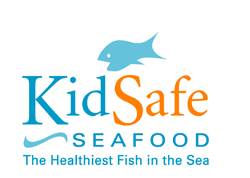 |
|
 |
|
Wild Alaskan Salmon: Chum, Coho and Pink
(also known as Wild Pacific Salmon)
 Wild Alaskan salmon is a great source of omega-3 fatty acids and a popular seafood choice for children.
Wild Alaskan salmon is a great source of omega-3 fatty acids and a popular seafood choice for children.
How to shop for it
KidSafe Seafood recommends that you buy wild Alaskan salmon fillets that are labeled chum, pink or coho. Look for them fresh and frozen.
Or purchase canned pink salmon. Note that canned salmon comes in two varieties:
- "Traditional": This packed salmon contains skin and tiny bones that are completely edible and add a rich delicious flavor, as well as calcium, protein, and omega-3s. For maximum health benefits, lightly mash the whole can together with a fork - the bones won't hurt your recipe.
- New skinless, boneless: This type is increasingly available—and makes an easy introduction to canned salmon for your young eaters.
Avoid chinook (king) and sockeye, which tend to have PCB levels that exceed the KidSafe Seafood health limits for small children.
KidSafe Seafood recommends that you also avoid farmed Atlantic salmon. These fish have been found to have particularly high levels of PCBs, and the farms where they are raised tend to have pollution problems and pose a threat to wild salmon and other wild fish.
How to cook it
Fresh or frozen fillets can be cooked in almost any way that you can imagine: Bake, broil or grill it however you like!
Canned wild Alaskan salmon is a great substitute for canned tuna. Mix it into salads, put it on sandwiches, toss it with pasta, or shape it into burgers.
More about Wild Alaskan Salmon
Chinook (king) and sockeye salmon exceed KidSafe Seafood's PCB guidelines even though they are very similar to the recommended coho, chum and pink salmon. So what';s the difference? Chinook and sockeye are longer-lived and fattier than coho, chum or pink salmon—giving them more time and space to accumulate toxins in their body tissues.
All five species of wild Alaskan salmon are among the better-managed fish stocks in the United States and have been certified as sustainable by the Marine Stewardship Council (MSC).
Home - Site Map - Privacy Policy - Donate - SeaWeb - Contact Us
© 2011 KidSafe Seafood